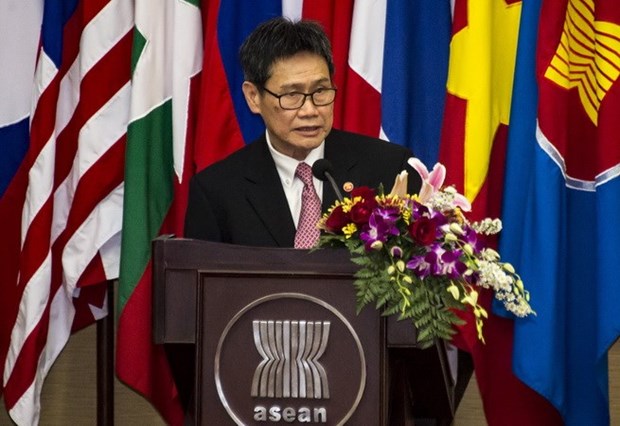Productivity improvement to make ASEAN more competitive
Closing the productivity gap in ASEAN will make the region more competitive as ASEAN integration continues to bring down trade barriers to support capital, goods, and labour movement within the region
 ASEAN Secretary-General Lim Jock Hoi (Photo: VNA)
ASEAN Secretary-General Lim Jock Hoi (Photo: VNA)Hanoi (VNA) – Closing the productivity gap in ASEAN will make the region more competitive as ASEAN integration continues to bring down trade barriers to support capital, goods, and labour movement within the region, said ASEAN Secretary-General Lim Jock Hoi.
Speaking at the plenary session of the Greater Mekong Subregion (GMS) Business Summit in Hanoi on March 30, the ASEAN leader emphasised the need to address infrastructure bottlenecks in the region, both physical and soft infrastructure.
Infrastructure is critical to sustain economic growth and productivity in ASEAN, he said, adding that it is estimated that the region needs around 110 billion USD to its finance its various infrastructure requirements for sustainable economic growth.
Various initiatives are underway to promote infrastructure development in the region, including the Master Plan on ASEAN Connectivity (MPAC). But more is needed. Aside from the challenges arising from weak regulatory framework, poorly structured projects and lack of capacity, financing infrastructure is critical.
While the public financing remains important, the private sector can be tapped as alternative sources of financing infrastructure investments. Modalities such as public-private partnerships can be further strengthened, while other innovative financing mechanisms such as using spill over revenues to support infrastructure investments by the private sector can be explored.
“There is a need to leverage on the power of digital economy,” he noted, saying that while ASEAN continues to benefit from digital transformation, understanding the digital economy remains a challenge because of its complexity.
ASEAN also needs to further invest in the region’s human capital, he said. Human capital has always been an important asset to firms and countries.
“But equally important is the ability of our human capital to learn new skills and adapt to the changing environment,” he stated.
Some of the major challenges facing rapid technological change are redundancy of industrial or unskilled labour and the lack of skills related to digital technology. As such, education and training systems need to evolve and foster flexibility and adaptability to help people adjust to the changing skills demand.
In closing, he reiterated the importance of addressing productivity improvement in ASEAN, saying this is an important challenge if ASEAN is to sustain economic development in the coming years.
With this greater challenge, the private sector will be playing an important role, particularly in closing the productivity gap. The need for productivity improvement creates more opportunities for companies to invest in new infrastructure and projects that will help each individual economy to explore activities that enhance productive capacity, he added.
The GMS Business Summit was part of the 6th GMS Summit and the 10th Cambodia-Laos-Cambodia Summit on Development Triangle Area (CLV-10) taking place in Hanoi from March 29-31.-VNA










